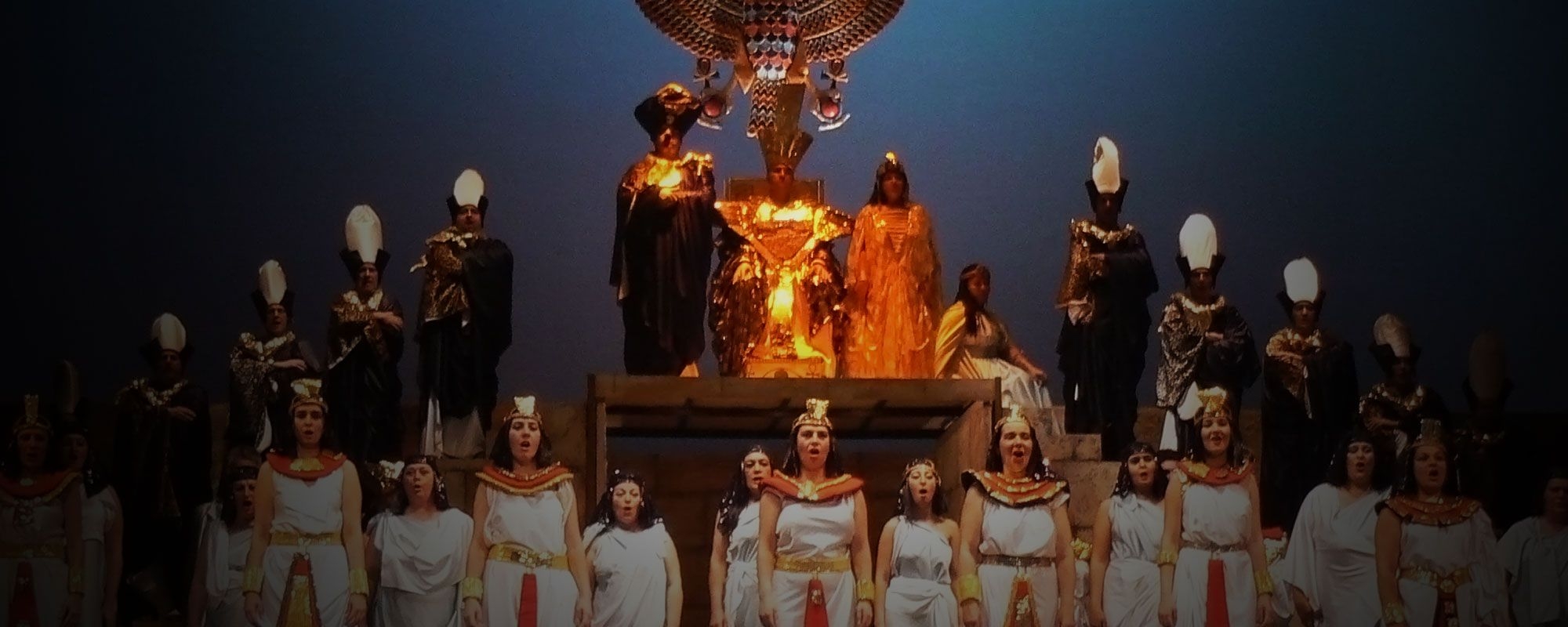Aida
Giuseppe Verdi

- World premiere
- Teatrul de Operă din Cairo, 24 decembrie 1871
- Romanian Opera Craiova Premiere
- 3 octombrie 2007
- Time Length
- aprox. 3h – o pauză
- Extra info
- Spectacol în limba italiană cu supratitrare în limba română
Opera in four acts composed by Giuseppe Verdi.
Libretto by Antonio Ghislanzoni and Camille du Locle after Auguste Mariette’s La fiancée du Nil.
The action takes place in ancient Egypt.
ACT I
Ethiopians have attacked Egypt again. Ramfis, the high priest of Egypt, will announce the name of the one who has been designated by the gods to lead the Egyptian army to victory. The young commander Radames wishes to be the chosen one, since, if he gains victory, he will be able to ask the Pharaoh that he should be granted the hand of Aida, a slave he is in love with (aria). However, the Pharaoh’s daughter, Amneris, also is in love with Radames. His concern towards Aida makes her jealous.
Goddess Isis has decided. The Pharaoh announces the name of the commander of the Egyptian army: Radames. The young man is installed to the office of commander-in-chief by means of a ceremony that takes place in the temple. Aida, the daughter of the Ethiopian king Amonasro, is torn with grief; Radames, the man she loves, will fight her country and her people. The slave falls to her knees begging the goddess Numi for forgiveness (aria). In the temple of Ptah, in a sacred ceremony, the priestesses pass through fire the sword that will relentlessly kill the enemies.
ACT II
The Ethiopians have been defeated. Amneris prepares to welcome the hero Radames and she will place the laurel wreath on his forehead herself. However, firstly, she wishes to uncover Aida’s secret. Following her purpose, Amneris lies to the slave and tells her that Radames is dead. Overwhelmed, Aida can no longer hide her love. In turn, the Pharaoh’s daughter confesses her feelings as well. The mistress and the slave are rivals (duet).
With the background of the Triumphal March, Radames is taken to the Pharaoh, who is joined by the proud Amneris. The young commander receives the winner’s laurel wreath.
He shall be granted any wish, as it happens with all winners. Among the prisoners, unknown to anyone, we find Amonasro himself, the king of Ethiopia and Aida’s father. He pleads for mercy for the defeated. Aida kneels in front of the Pharaoh too. Impressed, Radames asks that the prisoners should be released. Having to keep his promise, the Pharaoh accepts, but holds Aida and Amonasro as hostages. Afterwards, he offers to Radames the hand of his daughter and succession to the Egyptian throne.
ACT III
Accompanied by priest Ramfis, Amneris spends the night in the temple of Isis on the banks of the Nile, asking for the gods’ protection before her marriage. Close to the temple, there is the hidden place where Aida is waiting for Radames. The wretched slave is ready to throw herself in the sacred river if her lover will abandon her in order to marry the Pharaoh’s daughter. Aida sings of her grief and of her longing for the homeland she no longer hopes to see again (the Nile aria). Discovering his daughter’s love for the commander of the Egyptian army, Amonasro tries to convince Aida to find out from Radames the secrets of the battle plan against Ethiopians, especially the route that Egyptians will take when resuming the attack. Startled, Aida refuses, but her decision falters when Amonasro reminds her of her sacred duty to her country and people and to her condition as a princess. Radames arrives. No one and nothing will separate him from the one he loves and the one who loves him (duet). With no fear of betrayal, he reveals to Aida the route that Egyptians will take in battle. Amonasro comes out of his hiding. To his dismay, Radames finds himself facing the very king of Ethiopians (trio). Surprised by Amneris and Ramfis, Aida and Amonasro manage to escape, and Radames surrenders to the guards.
ACT IV
Radames will be judged and mercilessly condemned. Amneris manages to speak to the prisoner and promises that he will be forgiven provided that he gives up Aida. Accusing her of the slave’s death, Radames refuses. However, Amneris is not guilty of Aida’s death and Radames begins to hope that his beloved is still alive (duet). In court, he does not try to defend himself. The sentence is merciless and final – the traitor shall be buried alive.
In the lower floor of the Ptah temple, Radames discovers Aida, who has come to die with him (duet). Bent over the tomb, in tears, Amneris pronounces the sad prayer of the dead.
*Grigore Constantinescu & Daniela Caraman-Fotea, Ghid de operă, Bucharest, 1971
**Ana Buga & Cristina Maria Sârbu, 4 secole de teatru muzical, Bucharest, 1999
***Ioana Ștefănescu, O istorie a muzicii universale, Vol. IV, Bucharest, 2002

